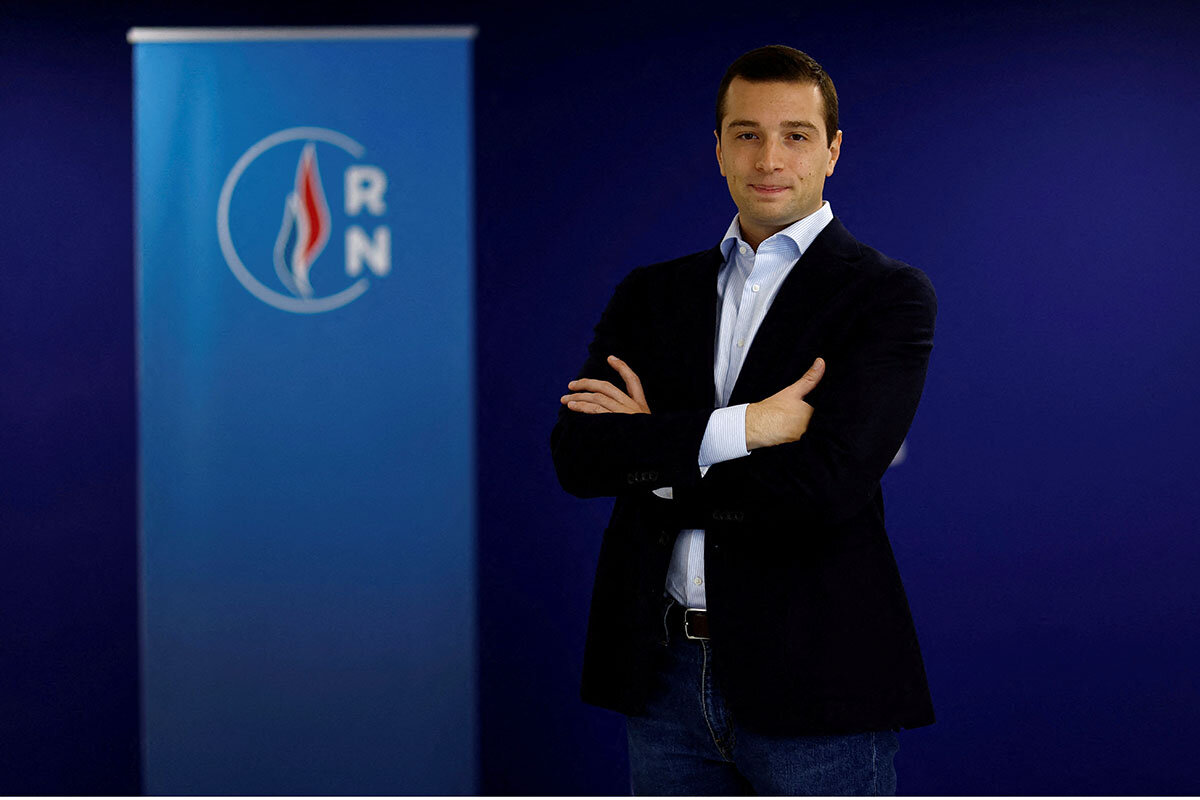Will a young, far-right leader mobilize apathetic French youth voters?
| Paris
Despite the consistent rise of the National Rally (RN) party in France, it remains deeply unpopular to support the far right. And yet, students say, there is no denying that the appointment of 27-year-old Jordan Bardella this month at the RN congress could breathe new life into a party marked by controversy.
As he looks forward to the future, Mr. Bardella will be banking on wider acceptance of the RN. Since Marine Le Pen took the reins from her father, she has consistently worked to erase the party’s history of antisemitic, anti-Muslim, and anti-immigrant rhetoric.
Why We Wrote This
A story focused onFar-right parties carry baggage of the past when racism was more openly expressed. A youthful new leader in France hopes to shed that history – and bring young people back to the polls.
Mr. Bardella – the child of Italian immigrants who grew up in a rough Paris suburb – has the potential to capture young people disillusioned by traditional politics. Experts say that his fresh face is, ultimately, an investment in the RN’s future, as it looks to continually renew its image, streamline its political offering, and appeal to a wider electorate.
“The younger people are, the further away they feel from politics,” says sociologist Olivier Galland. “But when they do vote, they tend to choose parties outside the mainstream. ... The profile of Jordan Bardella – an extremely young leader – could attract more young people to far-right politics.”
Groups of students huddle together during a break from class at the Institute of Higher Studies in Economics and Commerce in the chic 16th arrondissement in the west of Paris. The subject of politics comes up easily.
But when the conversation turns to Jordan Bardella, the young new leader of the far-right National Rally (RN) party, there are a few sidelong glances.
Despite the consistent rise of the RN in France – including here, just blocks from party headquarters and a growing bastion of far-right voters – it remains deeply unpopular to support the far right. And yet, students say, there is no denying that the appointment of 27-year-old Mr. Bardella this month at the RN congress could breathe new life into a party marked by controversy.
Why We Wrote This
A story focused onFar-right parties carry baggage of the past when racism was more openly expressed. A youthful new leader in France hopes to shed that history – and bring young people back to the polls.
“Everyone is talking about him on social media,” says Yann, taking a break with friends, Bitou and Marie. Like other students interviewed, Yann agreed to give his political opinions on the condition of using his first name only. “He’s good-looking, dynamic, eloquent. I think he’s going to have a significant impact on the National Rally.”
“People have a lot of prejudices about the RN, but there’s no shame in voting for them,” says Eva, a fellow student who has never voted for the far right, but is open to learning more about its new leader. “It’s a legitimate party like any other.”
As he looks forward to the future, Mr. Bardella will be banking on wider acceptance of the RN. Since Marine Le Pen took the reins from her father, Jean-Marie, who founded the party originally known as the National Front in 1972, she has consistently worked to erase the party’s negative image. Its history of antisemitic, anti-Muslim, and anti-immigrant rhetoric has hindered the RN from gaining widespread acceptance for decades.
Mr. Bardella – the child of Italian immigrants who grew up in a rough Paris suburb and represents a new generation of far-right voters – has the potential not only to challenge how the general public sees the RN, but also to capture young people disillusioned by traditional politics. Young people have the highest levels of voter abstention, especially in disenfranchised city suburbs, but those who do vote are increasingly backing extreme parties.
Experts say that Mr. Bardella’s fresh face, ultimately, is an investment in the RN’s future, as it looks to continually renew its image, streamline its political offering, and appeal to a wider electorate.
“The younger people are, the further away they feel from politics, and a majority say they don’t see themselves in any candidate or political party,” says Olivier Galland, research director emeritus at the National Center for Scientific Research (CNRS) who specializes in the sociology of youth.
“But when they do vote, they tend to choose parties outside the mainstream, like the Green or far-left parties, and to a lesser extent the far right. It’s possible that the profile of Jordan Bardella – an extremely young leader – could attract more young people to far-right politics.”
Making a case to young French
The RN has seen a steady rise at the polls at both the national and local levels in the past decade, especially among young voters. In 2017, Ms. Le Pen snagged upwards of 40% of the vote from those ages 18-34 in the second round of the presidential elections, and in 2022, those figures climbed to 57%.
But within those statistics are nuances on which Mr. Bardella could potentially focus his efforts. Until now, the RN has had significantly more success with young people between ages 25 and 34 who have recently entered the workforce, versus 18-to-24-year-olds, who are more likely to be students or living with their parents. The latter tend to be preoccupied by societal issues like access to healthcare and saving the environment, and are drawn to far-left politics.
“Young people who are seduced by the RN are in a fragile position. They’re those who have seen a degradation of their situation: lower salaries or job loss,” says Erwan Lestrohan, research director at the Odoxa polling institute. “The RN discourse is attractive because it is one that seeks to protect their interests,” he says.
“Bardella’s RN is one that is in line with anti-globalization, anti-elite, and protectionism, more than anti-immigration or focusing on security issues, like [rival far-right politician] Eric Zemmour.”
Known as a smooth, confident orator, Mr. Bardella told supporters after his win that he promised to “continue to normalize the RN,” making no allusion to identity politics within the party. Mr. Bardella, a fierce euroskeptic, joined as a teenager and became interim head of the RN last year while Marine Le Pen ran for president. Addressing the party, he said he planned to unite those who wanted to get France back on “the right track.”
But outside party support, Mr. Bardella – like his fellow politicians across the spectrum – has work to do to shore up enthusiasm among young voters. Those ages 18-24 showed record levels of voter abstention of 41% in the last presidential elections, compared with 38% for those ages 25-34. Abstention levels shot up to 71% in the June legislative elections among the 18-24 age group.
“Our studies show that young people are interested in a variety of topics, like domestic violence, the environment, gender equality. But that isn’t translated into traditional political participation,” says Mr. Galland, the CNRS researcher. “It’s more so shown through means of protest: participating in demonstrations or strikes, or expressing their opinions on social media. The fact that young people don’t vote doesn’t mean they aren’t engaged politically.”
A resistant demographic
As Mr. Bardella looks to tap into youth engagement, he will have to do more than rely on his upbringing and age to appeal to young voters who don’t traditionally vote for the far right. He remains little known outside his own party and has said he plans to continue the Le Pen legacy in the RN, which could discourage voters on the fence.
According to the most recent surveys by Odoxa, 40% of those polled rejected Mr. Bardella, putting him at the same level of popularity as Ms. Le Pen and far-left politician Adrien Quatennens, who stepped down from his political duties in September over domestic abuse allegations.
Primarily, Mr. Bardella will have to convince young voters in vulnerable suburbs, where rates of joblessness and poverty are high, that he has their interests at heart. In the presidential elections this past spring, voter abstention was at nearly 40% in Mr. Bardella’s hometown of Drancy, significantly higher than the national average of 28%.
Drancy and other working-class suburbs with large immigrant populations voted overwhelmingly for far-left candidate Jean-Luc Mélenchon in the last presidential elections, and many reject the RN’s historically anti-immigration stance.
Those facts are not lost on Mr. Bardella, who has aimed to appear more approachable to the French public. In February, he revealed some of the hardships of growing up in public housing to Gala magazine; in June, he told his Twitter followers that he had chosen his hometown as his last campaign stop before the legislative elections, writing, “never forget where you come from.”
But many young people in Drancy still say they feel left behind by politicians in general. At a local driving school just off the main drag, friends Kameron Magloire and Quentin Amaral say they’re surprised to learn that Mr. Bardella grew up like they did.
“Someone who grows up in les cités can never be the head of anything. It’s almost impossible to get out,” says Mr. Magloire, a livery driver who grew up in a public housing complex next door. “No one from this neighborhood is going to end up going to space.”
In terms of politics, “we still feel like we’re being told what to do and it’s always the same people who win,” says Mr. Amaral, who is currently unemployed and working to launch his own business. “We need someone who truly represents us.”










